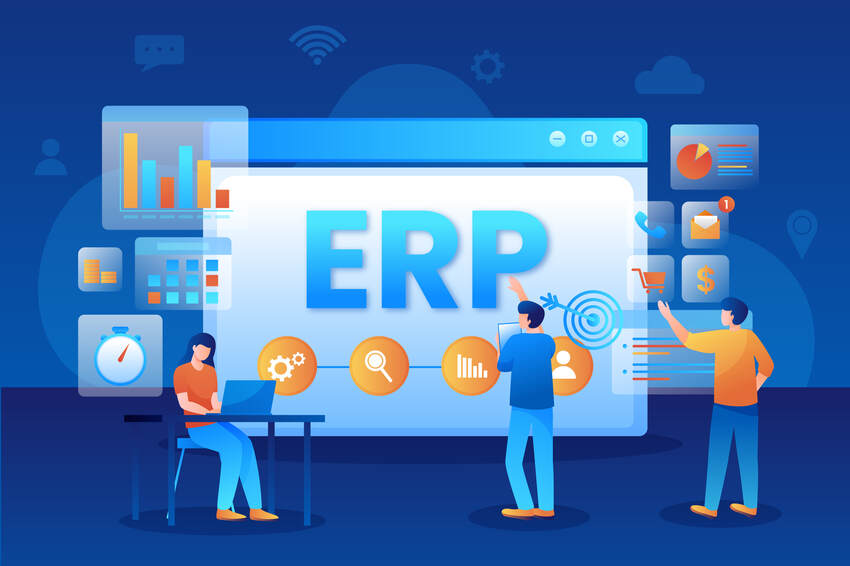ERP stands for enterprise resource planning. It is a comprehensive software system that is created to streamline and integrate the management of different code business procedures within the company. These procedures typically entail customer relationship management (CRM), procurement, manufacturing, supply chain management (SCM), human resource (HR) and finance. ERP solutions serve as a centralized platform where data from different functions and departments can utilized, analyzed, stored and gathered to enhance the overall decision-making and efficiency.
Introduction
While choosing the optimal ERP software for your company, it is advantageous to take into consideration the top 12 systems that are available in the market. During this discussion, we will address the top 12 systems for 2025 and beyond.
Here is the list of ERP Software Companies
1. Microsoft Dynamics 365
Microsoft Dynamic 365 Finance and Operations takes the 1st spot in our list. It holds an extensive appeal across a broad customer base. This company tends to aim larger and mid-market organizations, entailing a scope between Oracle and SAP’s concentration on bigger companies and Odoo/Netsuite’s focus on smaller organizations. This position permits Dynamic 365 to scale effectively while remaining fit for small and medium sized companies looking for technological deployment. Its family user interface and reminiscent of Microsoft’s signature feel and look, and its open architecture for flawless integration with 3rd party solutions lead to its popularity.
2. Oracle Fusion Cloud ERP
Oracle is known for its flexible and tailored solutions for huge companies. The primary target of Oracle is large multinational companies. The product itself is robust and capable of numerous functionalities that serves wide variety of needs. Importantly, Oracle Fusion Cloud ERP claims a higher degree of flexibility in comparison to SAP S/4HANA. This added flexibility leads to its good ranking in comparison.
In addition to this, Oracle costs better in terms of application results in comparison to its competitors. Even though occasional failures and challenges are observed, Oracle Fusion Cloud ERP has a lesser failure rate in comparison to SAP. Oracle Fusion Cloud ERP’s open architecture is remarkable. It improves compatibility with different solutions and system.
3. Infor
The perks of their investments in Cloudsuite are becoming more and visible. The product has progressed importantly. Nevertheless, it is significant to admit that faultiness still exists. Some confusion continues, aa an assimilation of solutions is sometimes needed to address various client requirements. Other than this, the progress Infor has made sets it apart. Their product is notably more in-depth than various options in the marketplace.
4. Acumatica
This company was established in 2008. It is a cloud-based ERP system that is created to organize business operation. It is specifically beneficial for new companies because of its flexibility and scalability.
You can modify Acumatica to fit your particular requirements without comprehensive coding. Its open API architecture also permits flawless integration with other apps. It supports data exchange and flawless workflows. Its real-time analytics and user-friendly interface allow you to make data-driven decision rapidly. However, it only target US based organizations.
5. Workday
Previously, workday focused only on HR technology, and human capital management and financials. However, Workday has just undergone considerable investments in supply chain investments. This substantially broadens the products ERP capabilities.
This company is attaining substantial grip in both the marketplace and sales cycle. Other than this, despite encountering application challenges like any software providers, workday is accretion a favorable track record for successful implementation. It is very important to reframe the way people perceive Workday. Perhaps, it has been earlier linked solely with financial or HR systems. It is important to view it as an in-depth ERP system.
6. Epicor
Epicor is a vendor with ownership over different systems. It entails distinct ERP systems, Prophet 21 and Vantage, each modified to particular industries. These industries entail retail, distribution and manufacturing- these sections commonly linked with Epicor’s offerings.
In coming years, the company faced struggles, specifically regarding troubled applications. They have an expert services group experienced deductions, and their network of application partners was ascended back. Nevertheless, presently we have witnessed an important turnaround. This company has created a fresh leadership team entailing professional industry executives. It is called an All-Star group. The seller’s route, along with their products, seems promising and progressing in a positive direction.
7. SAP S/4HANA
This company is indeed a robust capable of various functionalities, modified for Fortune 500 companies and other big worldwide companies. This positive side is coupled with some difficulties. Particularly, as SAP continues the change from on-premise solutions like R3 and ECC to their cloud-based S/4HANA, certain prominent shortages exist in the product.
Another factor to SAP S/4HANA’s prominent position in our list is implementation outcomes. These results have not been as promising as those of other software providers. There has been a considerable number of application failures within the SAP monarchy in these times.
8. IFS
IFS provides a different solution that places important emphasis on distribution, manufacturing, field services and construction. In comparison to other software vendors, IFS doesn’t fulfill every imaginable requirement. Other than this, they concentrate on their strengths and maintain a separate approach. Previous year, IFS was not that prominent but recently it has become very popular.
The main advantage of IFS is that it entails dedicated focus. In addition, they demonstrate robust worldwide growth and considerable dedication to growing their partners ecosystem. This supports sales and implementation of their solution.
9. Sage Intacct
It is cloud-based ERP solution best suited for SMBs looking advanced financial management capabilities. With a concentration on rationalizing accounting processes, it provides features general ledger management, accounts receivables and account payable.
It allows you to attain deeper insights into your financial performance. Its different functionalities entail project accounting, revenue recognition and multi-entity. This makes it an ideal choice for ideal choice for SMBs with difficult accounting requirements.
10. Oracle Netsuite
This company is a pioneer in the Software As A Service (SaaS) and cloud space. Their product is very mature, possessing an important record, in comparison to various legacy on-premise companies that are now moving towards to the cloud. Another important strength of Netsuite is its strong placement with mid-sized and small companies. If our evaluation concentrated on smaller customers, Oracle Netsuite could possibly secure a good ranking, possibly even reaching the best position. Yet, since we evaluate companies across different industries and sizes, NetSuite’s capabilities fall short for backing mid-sized and larger organizations.
11. Odoo
This company is an appealing option for mid-sized and small companies seeking simplicity and flexibility among a landscape filled with complicated ERP system. Other than this, it encourages cost-effectiveness, making it a feasible option for companies with scarce budget. Nevertheless, it is important to note that Odoo perhaps lack the complexity and scalability needed by bigger companies. In addition to this, there is a concern that Odoo as a company, might be outwitting by targeting larger companies while its software may not completely address the difficult requirements of such entities.
12. Force Platform by Salesforce
Force platform allows companies and 3rd party developers to expand functionalities of Salesforce and tailor them. This is attained via the development of 3rd party apps that add supplementary functionalities and feature layers. These apps target to particular industries or functions, allowing companies to develop semi-tailored solutions to broad ERP offerings.
Conclusion
Selecting the best ERP for your company is an important decision that can importantly affect your overall success and operations. Begin by evaluating your particular business goals and requirements. Take into consideration the factors like scalability, industry requirements and company size. Find the ERP software companies that align with your long-term growth plan and can adapt as per evolving business requirements.
Frequently Asked Questions (FAQs)
What is ERP?
It is a type of software system that assist companies automate and manage basic business processes for maximum performance.
What are the 5 components of ERP?
· Finance management and accounting
· Supply chain management
· Business intelligence
· Customer relationship management
· Human capital management
What are the benefits of ERP?
· Enhanced customer service
· Modified reporting
· Expanded collaboration
· Enhanced sustainability
· Enhanced productivity
Read Dive is a leading technology blog focusing on different domains like Blockchain, AI, Chatbot, Fintech, Health Tech, Software Development and Testing. For guest blogging, please feel free to contact at readdive@gmail.com.





